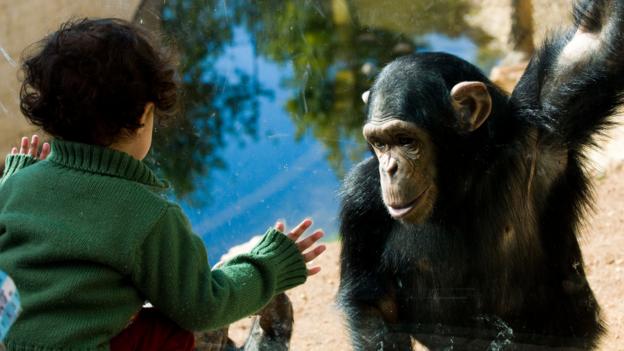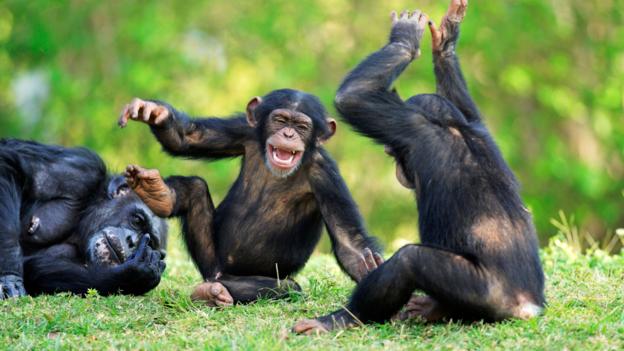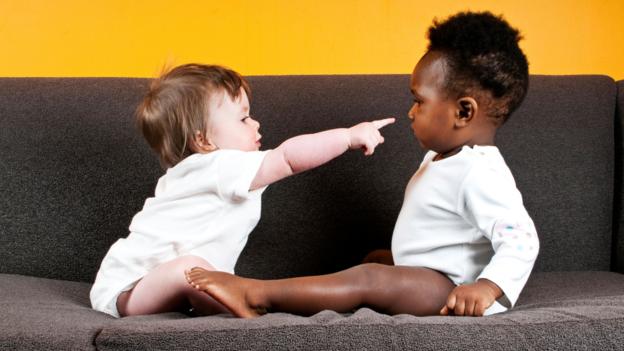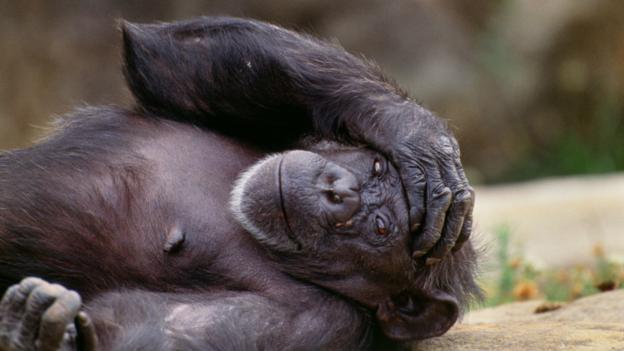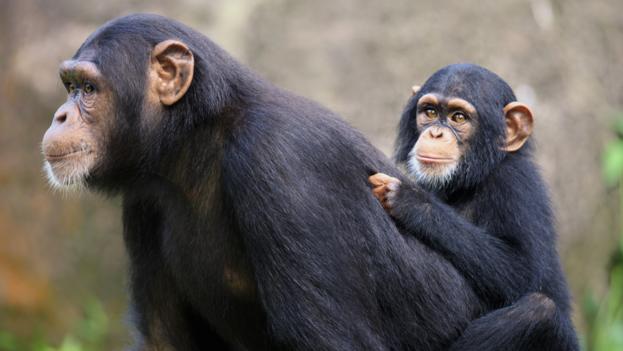I've spent the last four years teaching my daughter to be human.
There's a lot to learn, from walking, talking and the (strangely
challenging) task of not soiling yourself, to how to make choux pastry,
Chinese history and the basics of quadratic equations.
Although we
still have some way to go, it already feels like a hefty parental
investment, especially when compared with species like the
blue wildebeest,
whose newborns can stand, walk, and even outrun predators just a few
hours after leaving the womb. But humans aren't the only species
genetically predisposed to spend years rearing their offspring. Our
closest relatives, chimpanzees, also enjoy a prolonged childhood. As a
socially complex species, their infants stick close to their mothers for
the first five years of life, picking up a laundry list of essential
skills by observing and imitating their elders.
Telling a Picasso from a Monet, for example, should be easy for a chimpanzee
Many
skills that we consider complex are in fact the result of relatively
simple - and often universal - cognitive abilities shared by a great
many species
Of course, the life skills a chimpanzee eventually
acquires are nowhere near as complex as those I'm teaching my daughter.
Don't get me wrong –
learning how to make a termite-fishing stick
is cognitively complex, but it's hardly up there with learning to read,
or being able to differentiate between a Picasso and a Monet. After
four years of dedicated training from her parents, my daughter should be
able to beat a chimpanzee in a battle of wits, right?
Wrong. Or
at least, it depends on the battle. In fact telling a Picasso from a
Monet, for example, should be easy for a chimpanzee – both
honeybees and
pigeons
have been trained to do it. Scientists taught these small-brained
species that chambers next to pictures by one or other of these artists
contained food. When later presented with new Picassos and Monets, they
were more likely to opt for the artist whose work had previously led
them to a reward - meaning they had picked up on underlying stylistic
differences. Many skills that we consider complex are in fact the result
of relatively simple - and often universal - cognitive abilities shared
by a great many species.
In reality, when it comes to cognitive development,
the divide between infant chimpanzees and infant humans is often startlingly small.
So small in fact that psychologists once wondered if the key difference
between the two species was not our underlying mental machinery, but
the cultural traditions and recorded knowledge that humans had
accumulated through the ages. Perhaps if an infant chimpanzee was raised
in an exclusively human environment, it would acquire human abilities,
complete with language competency and table manners.
Previous experiments showed chimpanzees lacked the vocal structures to produce the sounds of human language
In order to test this hypothesis, Allen and Beatrix Gardner, psychologists at the University of Nevada, Reno, acquired
a 10-month-old chimpanzee named Washoe. She had been born in the wild in West Africa in 1965, where she was
"recruited" by the US Air Force
for use in biomedical testing as part of the space programme. The
Gardeners brought Washoe into their home in 1966. She was dressed in
human clothes, and joined the Gardeners at the dinner table each
evening. Every effort was made to replicate the childhood of a typical
human infant with the hope that she would not just learn human language,
but learn to be human.
Aware from previous experiments that
showed chimpanzees lacked the vocal structures to produce the sounds of
human language, Washoe was taught to communicate using a form of
American Sign Language. By the time she left the Gardeners in 1970, she
could communicate using a few hundred signed symbols. For some, the fact
that she could
combine symbols to form new words
such as "water bird" when shown a swan for the first time was evidence
of at least rudimentary language capacity. Many scientists, however,
remained skeptical, suggesting Washoe and other apes were simply
responding to unintentional cues from the researchers working with them.
It was obvious from the Gardeners' experiment that being
raised in a human environment could not give a chimpanzee a human mind.
Although she was one of the first non-human apes to communicate with
humans in the form of signed symbols, she did not ever truly acquire
language. The question scientists still wrestle with today is what
exactly is going on in the minds of toddlers that allows them to acquire
and use language where chimpanzees fail? And how does this relate to
the skills that define human intelligence, allowing us to create moon
landers and chai lattes?
The human need for deeply cooperative group living brought with it the ability to get into each other's heads
Michael
Tomasello, a psychologist and co-director of the Max Planck Institute
for Evolutionary Anthropology in Leipzig, Germany, has spent the last 30
years studying primate cognition in an effort to answer questions like
these. In his recently published book
A Natural History of Human Thinking,
he develops the "shared intentionality" hypothesis to explain the basic
difference between human and chimpanzee cognition. He defines this as
the ability "
to participate with others in collaborative activities with shared goals and intentions".
"Although
humans' great ape ancestors were social beings, they lived mostly
individualistic and competitive lives," suggests Tomasello, "but early
humans were at some point forced by ecological circumstances into more
cooperative lifeways, and so their thinking became more directed toward
figuring out ways to coordinate with others to achieve joint goals or
even collective goals. And this changed everything."
This human
need for deeply cooperative group living brought with it the ability to
get into each other's heads. Being able to share intentions and goals in
this way is extremely rare in the animal kingdom, and
many experiments suggest that it's a skill that my daughter has, but that chimpanzees - like Washoe - lack.
Consider the enigma of human pointing –
a strangely difficult signal for chimpanzees to wrap their heads around.
They do not typically point in the wild, although individuals working
with humans in the lab will often gesture towards food or objects they
want, and sometimes they do so with a pointed finger. What scientists
want to know however is whether or not a pointing chimpanzee is trying
to connect with the person watching them by establishing collaborative,
two-way communication. It is obviously a communicative act, but the
question is whether it is the result of the chimpanzee trying to get
inside the head of the observer to convey the message: "Excuse me, I
would really like you to fetch that banana for me."
Whereas the babies sat politely and pointed toward the object in an
attempt to get their caregiver's attention, the chimpanzees moved
towards the object while making pointing and reaching gestures
For
humans, these collaborative messages are commonplace, even without the
use of language. Imagine for a moment that I had lost my voice. I could
ask my wife to pass the salt simply by pointing to the salt shaker
sitting on the table. Via this signal, I could share with my wife the
knowledge that I want the salt, and she would immediately realize that I
am asking for her help in achieving what I hope is now a shared goal. I
don't need to fling myself across the table while making exaggerated
grabbing motions.
Chimpanzees, on the other hand, do.
In a recent experiment,
chimpanzees were pitted against one-year-old children to see how their
behaviour differed when something they wanted was just out of reach.
Whereas the babies sat politely and pointed toward the object in an
attempt to get their caregiver's attention, the chimpanzees moved
towards the object while making pointing and reaching gestures. The key
difference, the researchers concluded, was that the human infants
realized the pointing gesture alone was enough to tell their caregiver
what they wanted.
Humans, it seems, are born ready to share their thoughts with others.
Once we set aside the cognitive traits that encompass
Tomasello's idea of shared intentionality, however, the list of skills
that my daughter possesses that surpass those of chimpanzees is nearly
exhausted. In fact, there are cognitive skills at which chimpanzees can
easily outshine my daughter. Or you and me for that matter.
In another recent study,
chimps went head-to-head with humans in a test of their strategic thinking.
Participants played a simple two player computer game in which they had
to choose one of two squares displayed on a screen. Player one won if
both players chose the same square, and player two won if both of them
chose the opposite squares. After each game, the two players could see
which one their opponent had chosen, allowing them to learn about their
opponent's behaviour and make educated guesses about their future
choices. Players were pitted against others of their own species, and
human winners were rewarded with cash prizes while chimps that came out
on top got pieces of apple.
If the players make the best possible
moves, the game should develop a specific pattern predicted by game
theory. It turned out that after playing the game for a while,
chimpanzees made moves that closely resembled the optimal strategy
predicted by mathematical models. Humans, on the other hand, didn't.
Perhaps humans just don't have the level of fighting spirit (or desire
for infidelity) that gives chimpanzees the edge in some battles of wits
With
our infamous critical thinking skills, how could humans wind up being
soundly beaten by chimpanzees? We know from previous research that
chimpanzees can have stunning visual memory, and this might be the key
to their success.
Ayumu,
a young chimpanzee involved in cognitive research at the Primate
Institute of Kyoto University, in Japan, is famously able to memorize
the position of the numbers one to nine in random positions on a screen
in as little as 0.67 seconds.
No human even came close to Ayumu's performance. The scientists studying Ayumu suggest that
chimpanzees simply have a better working memory for visual information than humans - which might explain why they can beat us in strategy games involving visual tasks.
The researchers who ran the computer game experiment suggest that it might also be
the ultra-competitive mindset of the chimpanzee
that makes them better at developing strategies. Chimpanzees live in a
social world where they are often trying to outwit other members of
their inner circle. Lower ranking males, for example, try to outwit the
alpha males by having secret trysts with females behind their backs.
Plotting and scheming might be second nature to chimpanzees.
Perhaps
humans just don't have the level of fighting spirit (or desire for
infidelity) that gives chimpanzees the edge in some battles of wits.
Maybe in some cognitive realms our bias towards co-operating lets us
down.
All of which leaves me wondering whether it's really
fair to consider my young daughter to be any smarter than a chimpanzee.
Chimpanzees lead lives that are not all that dissimilar from our own
recent ancestors in the days before we invented, and were able to share
our knowledge of, medicine, mathematics and physics. And much of the
social behaviour, problem solving, and reasoning displayed by
chimpanzees frolicking in the bush is still indistinguishable from
children playing in the schoolyard. And, as we've seen, they even
outperform humans at some skills.
In the end, though, it's not
about who’s smarter. Both chimpanzees and humans have cognitive skills
that help them survive in their own worlds. Over the next few years, my
daughter's mind will blossom in uniquely human ways. She'll tap into her
shared intentionality skillset, and join the ranks of schoolchildren
learning their ABCs and capital cities. Thanks to her human mind, this
knowledge will be transferred straight from her teacher's mind to hers
through the medium of language. These skills don't make my daughter any
smarter than a chimpanzee because
smartness is a concept that is in the eye of the beholder.
From
my very human perspective, experiencing my daughter wanting to share
her thoughts with me is about the best thing in the whole wide world. I
suspect chimpanzee mothers love their young just as deeply though, even
if they can't – or don't want to – tell anyone about it.

